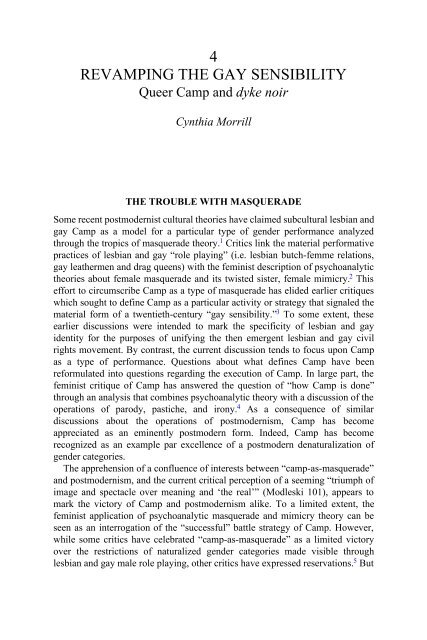Edited by Moe Meyer - Get a Free Blog
Edited by Moe Meyer - Get a Free Blog
Edited by Moe Meyer - Get a Free Blog
You also want an ePaper? Increase the reach of your titles
YUMPU automatically turns print PDFs into web optimized ePapers that Google loves.
4<br />
REVAMPING THE GAY SENSIBILITY<br />
Queer Camp and dyke noir<br />
Cynthia Morrill<br />
THE TROUBLE WITH MASQUERADE<br />
Some recent postmodernist cultural theories have claimed subcultural lesbian and<br />
gay Camp as a model for a particular type of gender performance analyzed<br />
through the tropics of masquerade theory. 1 Critics link the material performative<br />
practices of lesbian and gay “role playing” (i.e. lesbian butch-femme relations,<br />
gay leathermen and drag queens) with the feminist description of psychoanalytic<br />
theories about female masquerade and its twisted sister, female mimicry. 2 This<br />
effort to circumscribe Camp as a type of masquerade has elided earlier critiques<br />
which sought to define Camp as a particular activity or strategy that signaled the<br />
material form of a twentieth-century “gay sensibility.” 3 To some extent, these<br />
earlier discussions were intended to mark the specificity of lesbian and gay<br />
identity for the purposes of unifying the then emergent lesbian and gay civil<br />
rights movement. By contrast, the current discussion tends to focus upon Camp<br />
as a type of performance. Questions about what defines Camp have been<br />
reformulated into questions regarding the execution of Camp. In large part, the<br />
feminist critique of Camp has answered the question of “how Camp is done”<br />
through an analysis that combines psychoanalytic theory with a discussion of the<br />
operations of parody, pastiche, and irony. 4 As a consequence of similar<br />
discussions about the operations of postmodernism, Camp has become<br />
appreciated as an eminently postmodern form. Indeed, Camp has become<br />
recognized as an example par excellence of a postmodern denaturalization of<br />
gender categories.<br />
The apprehension of a confluence of interests between “camp-as-masquerade”<br />
and postmodernism, and the current critical perception of a seeming “triumph of<br />
image and spectacle over meaning and ‘the real’” (Modleski 101), appears to<br />
mark the victory of Camp and postmodernism alike. To a limited extent, the<br />
feminist application of psychoanalytic masquerade and mimicry theory can be<br />
seen as an interrogation of the “successful” battle strategy of Camp. However,<br />
while some critics have celebrated “camp-as-masquerade” as a limited victory<br />
over the restrictions of naturalized gender categories made visible through<br />
lesbian and gay male role playing, other critics have expressed reservations. 5 But


